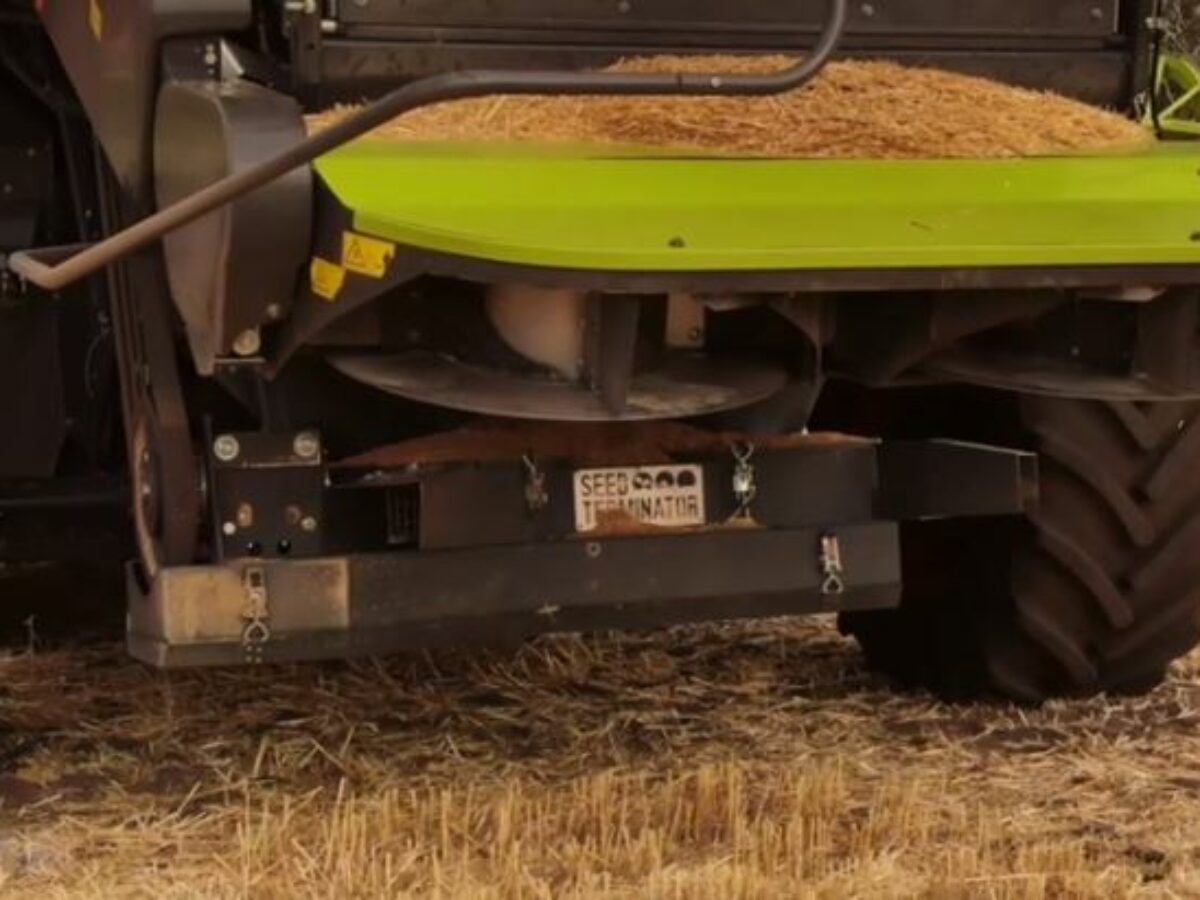Manufacturing news briefs – stories you might have missed

Seed Terminator reaps benefits of non-chemical weed control
Seed Terminator's non-chemical weed control equipment is making waves on farms with its technology that destroys weed seeds during harvesting. The Seed Terminator (pictured) is attached to a combine harvester and processes material before it is returned to the soil. Seed Terminator's Mark Ashenden said: “It basically smashes the bejesus out of weed seeds and spreads them back as natural nutrients back onto the soil.” This reduces the need for crop spraying and lifts yields as crops no longer have to compete with weeds. The company began 11 years ago when founder Nick Berry began PhD studies at the University of South Australia, with the outcome a commercial product. Seed Terminator has notched up $1 million in exports in the past four years, and has a potential market of 8,000 harvesters in Australia alone.
Amphibious ship HMAS Choules undocks after successful upgrades
A programme of works updating amphibious Landing Ship Dock HMAS Choules has successfully undocked as scheduled after the completion of her programme of works. The undocking marks the half-way point of Refit Period 21 (RP21) where Atlantic & Peninsula Australia are simultaneously delivering a sustainment work package at the same time as the installation of numerous major capability enhancements for the SEA3030-2 Capability Assurance Project (CAP). This project is likely the largest ship repair conducted in Sydney in the past 15 years and will span over 300 days, cost approximately $90m and be delivered by over 80 suppliers with up to 400 personnel involved each day.
Australian Vanadium signs agreement to supply iron titanium product
Vanadium producer Australian Vanadium has signed an offtake agreement with China's Rizhao Steel for the supply of the iron titanium (FeTi) co-product to be produced from its Western Australian metals project. Rizho, which is China's biggest importer of titanium bearing concentrate, will take 900,000 tonnes a year of FeTi and 11,200 tonnes of vanadium pentoxides (V2O5) from AVL's Geraldton processing plant. AVL managing director Vincent Algar said the company's product would cost effectively improve operational efficiency for Rizhao's plants in Shandong, China. it is suited to iron sintering, providing a low cost titanium source and additional low-cost iron units.
Universal Biosensors aims to raise $25 million
Diagnostic test systems manufacturer Universal Biosensors has launched an entitlement offer to shareholders to raise $20 million via the issue of CHESS depositary receipts, a financial tool similar to owning shares in a company. The company is also in the process of undertaking a placement of new CDI's to institutional investors to raise $5 million. The fully underwritten raising will accelerate product development, scale up manufacturing and R&D capabilities and for working capital. UBI markets its Sentia wine testing platform device which tests wine for sulphur dioxide, glucose, malic acid and other components of wine, using technology applicable in other areas of testing. CEO Jim Sharman said the UBI was at a point of expanding to a number of ‘company changing addressable market opportunities'.
PharmAust receives R&D tax refund
Biotechnology company PharmAust has received a $708,000 research and development (R&D) tax refund for work undertaken in its subsidiaries Epichem and Pitney Pharmaceuticals. PharmAust's Sam Wright said the support critical R&D work. “The receipt of the R&D refund strengthens PharmAust’s financial position to executive on our upcoming clinical trials.” The company plans a phase 1 clinical trial of its lead drug monepantel (MPL) in motor neurone disease (MND).
City of Cockburn studies green hydrogen plant
The Western Australian government has announced the completion of a feasibility study for a green hydrogen plant in the City of Cockburn. The study investigated the use of green hydrogen to displace fossil fuels in the city's operations, including fleet and administrative buildings. The study successfully delivered a design for a green hydrogen facility, which also makes use of existing landfill gas power to enable round-the-clock off-grid hydrogen production. The renewable hydrogen produced would be used to sustainably refuel the city's refuse collection vehicles, including the option to re-use leachate water. The design features an east-west solar field, a fully containerised water treatment plant, and a modular hydrogen production and refuelling plant capable of producing 440 kilograms per day hydrogen production and 1,000 kg hydrogen storage.
Picture: Seed Terminator
Subscribe to our free @AuManufacturing newsletter here.
Topics Manufacturing News
@aumanufacturing Sections
Analysis and Commentary Awards casino reviews Defence Gambling Manufacturing News Online Casino Podcast Technology Videos





